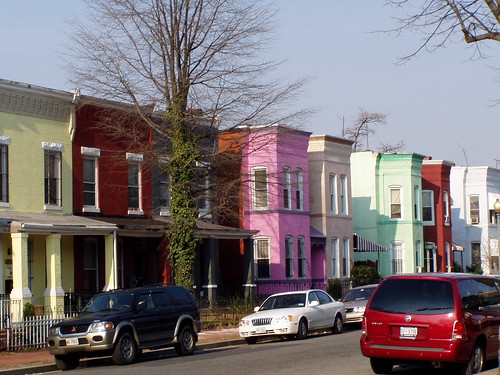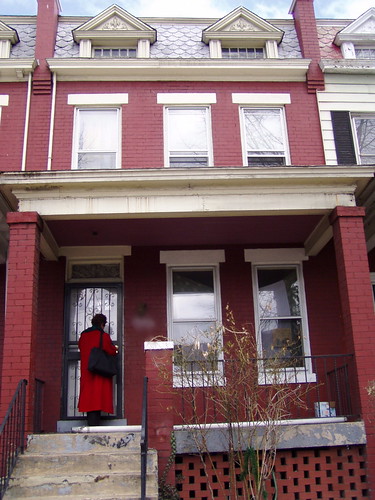Trinidad Nights

I've closely followed coverage over the last couple months of the spate of violence in the D.C. neighborhood of Trinidad, which has ultimately resulted in two separate cases of the police setting up checkpoints and only letting in residents or those with documented business. I think of D.C. as a city in and of itself before adding in the federal government (whereas for most Americans its identity is exclusively the government), so I will set aside the obvious absurdity of checkpoints all of two miles from the Capitol, which was enough to ensure it international coverage. It is nonetheless a tragic breakdown of civic life when such a measure is deemed necessary -- and done without community consultation, I should add. Checkpoints are precisely the mechanism of urban segregation, stigma, and ghettoization. "Several years ago, Richardson said, she removed the steel grate from her center's front doors, and she plans on taking the bars off the windows. The checkpoint, she said, was infuriating because it suggested Trinidad has not changed." I can remember from my own experience in Rocinha the startling sensation of entrapment during a police invasion.

The outcry was widespread, and the legal challenges came quickly to reverse the status of "occupied Trinidad." While a Post editorial asks why there was more protest over the checkpoints than the murders, I can point to some compelling community efforts to the contrary, notably a mock burial for snitching led by the venerable D.C. anti-violence group Peaceoholics.
WAMU, the D.C. NPR affiliate, also ran a story on another anti-violence event (audio for RealPlayer & Windows Media), where go-go beats hover in the background as soon as it opens. It featured Anwan Glover, better known to many outside of D.C. as Slim Charles. In D.C., though, he's better known as Big G of go-go legends Backyard Band, credited with bringing more of a hardcore rap style to the go-go scene.
"Keep It Gangsta," if that gives you any idea.
Holding it down in Southeast D.C., very much the heartland for go-go. Audio is kind of rough, but the home movie feel is definitely charming. Now though, Big G is using his clout, the kind that only a go-go star who used to be a banger can bring to young black D.C., to bring home the message for D.C. neighborhoods that violence has got to go. Music is a way out of violence -- it was for Big G and it is for some of the kids interviewed in the story.
The GoTube commentators have it too. As TnUt00bLvr writes: "I'm with you for real, then niggas wonder why they gots to go all the way to Va.& Wheaton to see them play?STOP beefin in the local spots then y'all can party with Back!!You just taking GoGo farther & farther away from HOME because of bullshit!! Quit reppin hoods you rentin' or live with your folks in man!!" Inner-city violence is definitely another factor in the suburban dissemination of go-go.
The WAMU story is particularly penetrating for me, though, because of the comments by John Roman of the Urban Institute. He delves into the economics of the drug trade and then segues to a geographical analysis of how the neighborhood functions in the wider urban network: "At first, it's hard to see how this tiny neighborhood of brick row houses with wooden porches could be home for such violence. Bordered on one end by Gallaudet University and the other end by the National Arboretum, Trinidad physically lives up to its billing as a garden community. But as Roman observes, the layout of the neighborhood and its location have also made it a major hub for illegal drugs."
Parsing it down to one-way streets and proximity to particular avenues is a brilliant way of thinking about Trinidad's problems -- they don't exist in a vacuum, but rather at the core relate to how the neighborhood fits into the broader grid of D.C. On the flip side, the corner view is important too, and stalwart local columnist Courtland Milloy does what needs to be done: he drives into Trinidad in the hours before "killing time" to talk to residents.
On the blog-a-front, I was excited to discover inked, a blogger who lives in Trinidad. She writes at Frozen Tropics (Trinidad in a D.C. winter?), where the July posts are a frantic recap of hourly updates on shootings, checkpoints, and homicides. Digging through her archives, I found a great post on Trinidad houses that shows how picturesque much of the neighborhood really is. She is also a studious chronicler of the revival of the H Street corridor, still reeling forty years after the '68 riots. Her sense of both neighborhood pride and civic engagement is heartening, to say the least, and has already mitigated much of the hysteria that seeped through the media coverage of events in the neighborhood over the last couple months, which makes it all too easy for someone who has never visited the neighborhood to write it off on news coverage alone.
Enjoy your beautiful rowhouse, inked, and be safe.

Labels: d.c., go-go, neighborhoods, violence

1 Comments:
A kid who tells on another kid is a dead kid.
Fuck snitchers! Gapping to the police will never keep your community safe! That's just not simply the way!
If you want you neighborhood to be safe, start working together. Open a social center like they do in Italy. Start cooperating, start communicating!
The police is the enemy of all working class people, everywhere in this corner of the earth! Never forget that!
Post a Comment
<< Home